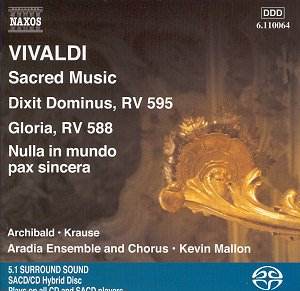There is a little bit
of a marketing issue with this CD. If
we consider the public perception of
Vivaldi it is obviously based around
the Four Seasons. For those prepared
to look a bit deeper certain other works
are exceedingly popular. We can include
some of the Mandolin (guitar)
Concertos, and the Gloria
in D major RV 589. No less popular
is the Dixit Dominus RV594.
Now it so happens that
a true Vivaldi enthusiast will know
a) the RV numbers and b) that Vivaldi
not only wrote some 400 concertos but
also two Dixits and two Glorias.
I have to wonder if the tyro may not
end up buying the wrong CD. In mitigation,
Naxos does explain on back of the cover
that these are ‘second’ settings of
the well-known works. I just hope that
not too many people are confused, annoyed
or disappointed. Having said that, there
is nothing to be disappointed about
on this CD. The ‘alternative’ versions
of these quasi-liturgical motets are
equally fascinating as their better
known counterparts.
None of these works
are in short supply in the CD market
place. Yet Naxos has been clever in
presenting the two ‘alternative’ versions
of the Gloria and Dixit Dominus
on the one CD. Coupled with this is
the less well known ‘motet’ ‘Nulla
in mundo, pax sincera’ which is
truly a gem waiting to be discovered.
The ‘Nulla’
is extremely lightly scored, being set
for soprano soloist, strings and continuo.
The text repays study. The work opens
with a gorgeous ‘siciliano’ which is
representative of the pastoral imagery
so popular in the 18th century.
Yet the words are hardly bucolic: -
‘In the world is no sincere peace, without
gall ... Amid punishments and torments
the soul lives content in the sole hope
of chaste love.’ Solace, apparently
is in Christ alone. It is one of those
works that I imagine paints a picture
of a society where no one is ‘naughty’
– there is no ‘chambering’ as the Authorised
translator of St Paul would have said.
However the sting is in the tail. The
eroticism of the closing words reveals
that mankind has not really changed,
in spite of conventions. The soprano
sings, ‘But by its hidden mouth touched,
a man maddened in love often flows like
honey.’ However we interpret these words
– whether as religious allegory or as
good old fashioned love poetry is irrelevant.
The beauty is in the score. Jane Archibald
sings this work with such charm and
even innocence one could hardly imagine
anything improper about these words.
The closing Alleluia makes everything
OK and drags it back to ecclesiastical
usage. A complex and elaborate finish
to a lovely work.
The Gloria RV 588
is an interesting companion piece to
the more famous RV 589. I suppose
if I were asked to spell out the differences
I would be hard pressed. However I think
it would be fair to say that the former
is a touch more subtle than the latter.
The work can be linked to an introductory
Jubilate, o amoeni chori, (Rejoice,
fair choirs) although this is not essential.
Naxos has chosen to make this coupling
to good effect. The balance between
the Jubilate and the Gloria
is pointed up by the scoring. The first
is scored for solo, strings and continuo
and the second for the full orchestral
and choral works including trumpets.
The CD opens with the
second surviving version of the Vesper
Psalm Dixit Dominus – The Lord
said unto my Lord. This is a big work
by any standards. It is scored for two
oboes, trumpet, strings, continuo, five
soloists and a five part chorus. What
I find totally striking is the mood
swings of this work. It is almost as
Vivaldi has chosen to write a series
of choral variations following the theme
of the psalm. From the opening ‘celebratory’
flourishes to the restrained contralto
solo in the music for the De torrente
in via bibet – He shall drink of
the brook in the way. Or the solo trumpet
hinting at the judgment to come in the
Judicibat in nationibus – he
shall judge all nations to the delicious
duet for two sopranos in the Tecum
principium – The power to rule is
with you. I cannot say that this work
is more or less enjoyable than the other
version – that would be disingenuous.
What I will say is that this is a fantastic
work that well deserves to be considered
beside the better known version.
There is no doubt that
this is a rare and fine performance
of these lesser known works. Kevin Mallon
is well able to control the forces of
the Toronto based Aradia Ensemble and
Chorus. Their aim is to play early music
on original instruments and supported
by appropriate scholarship to recreate
the best possible sound. They have recorded
a mix of orchestral, operatic and choral
works with a score of recordings for
Naxos including music by Boyce, Saint-Georges,
Rameau and Handel.
For the curious, Aradia
(not Arcadia!) was the daughter of Apollo’s
twin sisters. She was sent to mankind
to ‘order the music of the natural world
into song’.
I have no problems
with the fantastic (SACD) sound quality
of this disc; the programme notes are
adequate if a little dense. My only
complaint is the rather boring cover
photograph of what I am not quite sure!
Surely they could have found an appropriate
painting of sculpture to grace this
fine CD.
John France


